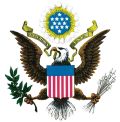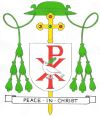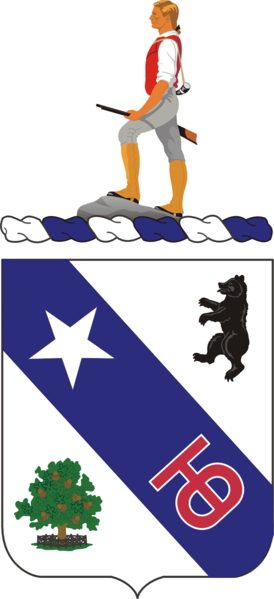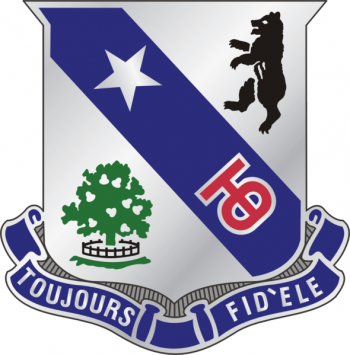360th (Infantry) Regiment, US Army: Difference between revisions
Knorrepoes (talk | contribs) m (Text replacement - "===Origin/meaning=== {{missing}} {{media}}" to "===Origin/meaning=== {{missing}} {{media}}") Tags: Mobile edit Mobile web edit |
No edit summary |
||
| Line 14: | Line 14: | ||
===Official blazon=== | ===Official blazon=== | ||
Crest: That for | Shield: Argent, a bend Azure charged with a mullet of the first and the insignia of the 90th Division Gules (the "OT" monogram) fimbriated of the field (Argent), in sinister chief a bear rampant Sable and in dexter base an oak tree surrounded by a cordon of barbed wire Proper.<br> | ||
Crest: That for regiments and separate battalions of the Army Reserve: On a wreath of the colors (Argent and Azure) the Lexington Minute Man Proper. The statue of the Minute Man, Captain John Parker (H.H. Kitson, sculptor), stands on the Common in Lexington, Massachusetts.<br> | |||
Motto: TOUJOURS FID'ELE (Always Faithful). | |||
Distinctive Unit Insignia. Description: A Silver color metal and enamel device 1 1/4 inches (3.18 cm) in height consisting of a shield blazoned: Argent, a bend Azure charged with a mullet of the first and the insignia of the 90th Division Gules (the "OT" monogram) fimbriated of the field (Argent), in sinister chief a bear rampant Sable and in dexter base an oak tree surrounded by a cordon of barbed wire Proper. Attached below the shield a Blue scroll inscribed "TOUJOURS FID'ELE" in Silver letters. | |||
===Origin/meaning=== | ===Origin/meaning=== | ||
The bear was carried as a mascot throughout World War I. The tree with barbed wire around the trunk is symbolic of capture by the 360th Infantry of the fortified Bois-le-Pretre on September 13, 1918, which was the regiment's most outstanding feat of arms in World War I. The star represents Texas, the Lone Star State, where the regiment was organized. The "OT" monogram (90th Division insignia) alludes to the regiment's service with the 90th Division in World War I. | |||
The Coat of Arms was originally approved for the 360th Infantry Regiment, Organized Reserves on 28 May 1925. It was redesignated for the 360th Regiment, Army Reserve on 26 January 1962. The Distinctive Unit Insignia was originally approved for the 360th Infantry Regiment, Organized Reserves on 7 June 1926. It was redesignated for the 360th Regiment, Army Reserve on 26 January 1962. | |||
{{media}} | {{media}} | ||
[[Literature]]: Images from Wikimedia Commons | [[Literature]]: Images from Wikimedia Commons. Information from The Institute of Heraldry, US Army. | ||
[[Category:Military heraldry of the United States]] | [[Category:Military heraldry of the United States]] | ||
[[Category:Army heraldry]] | [[Category:Army heraldry]] | ||
[[Category:Granted 1925]] | |||
[[Category:Granted 1926]] | |||
Revision as of 11:57, 20 March 2021
US heraldry portal
This page is part of the US heraldry portal |
Heraldry of the World |
|
US heraldry:
|
Ecclesiastical Heraldry of the USA:
Military Heraldry: |
360TH (INFANTRY) REGIMENT, US ARMY
| (Coat of Arms) |
(Distinctive Unit Insignia) |
Official blazon
Shield: Argent, a bend Azure charged with a mullet of the first and the insignia of the 90th Division Gules (the "OT" monogram) fimbriated of the field (Argent), in sinister chief a bear rampant Sable and in dexter base an oak tree surrounded by a cordon of barbed wire Proper.
Crest: That for regiments and separate battalions of the Army Reserve: On a wreath of the colors (Argent and Azure) the Lexington Minute Man Proper. The statue of the Minute Man, Captain John Parker (H.H. Kitson, sculptor), stands on the Common in Lexington, Massachusetts.
Motto: TOUJOURS FID'ELE (Always Faithful).
Distinctive Unit Insignia. Description: A Silver color metal and enamel device 1 1/4 inches (3.18 cm) in height consisting of a shield blazoned: Argent, a bend Azure charged with a mullet of the first and the insignia of the 90th Division Gules (the "OT" monogram) fimbriated of the field (Argent), in sinister chief a bear rampant Sable and in dexter base an oak tree surrounded by a cordon of barbed wire Proper. Attached below the shield a Blue scroll inscribed "TOUJOURS FID'ELE" in Silver letters.
Origin/meaning
The bear was carried as a mascot throughout World War I. The tree with barbed wire around the trunk is symbolic of capture by the 360th Infantry of the fortified Bois-le-Pretre on September 13, 1918, which was the regiment's most outstanding feat of arms in World War I. The star represents Texas, the Lone Star State, where the regiment was organized. The "OT" monogram (90th Division insignia) alludes to the regiment's service with the 90th Division in World War I.
The Coat of Arms was originally approved for the 360th Infantry Regiment, Organized Reserves on 28 May 1925. It was redesignated for the 360th Regiment, Army Reserve on 26 January 1962. The Distinctive Unit Insignia was originally approved for the 360th Infantry Regiment, Organized Reserves on 7 June 1926. It was redesignated for the 360th Regiment, Army Reserve on 26 January 1962.
Contact and Support
Partners:
Your logo here ?
Contact us
© since 1995, Heraldry of the World, Ralf Hartemink 
Index of the site
Literature: Images from Wikimedia Commons. Information from The Institute of Heraldry, US Army.
















